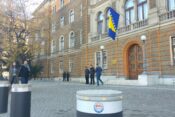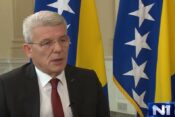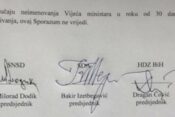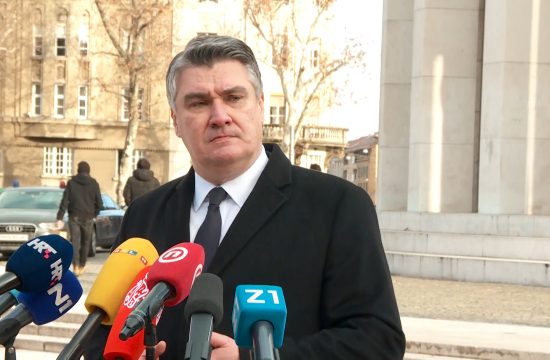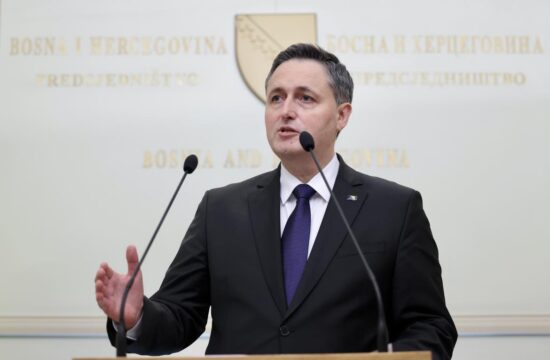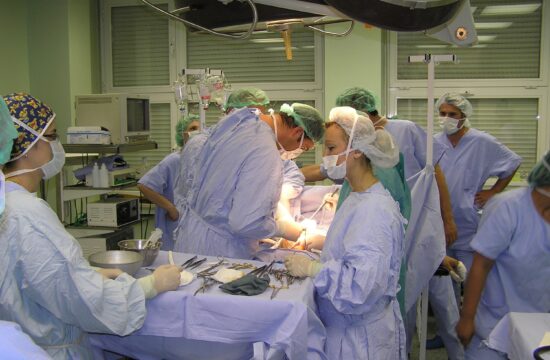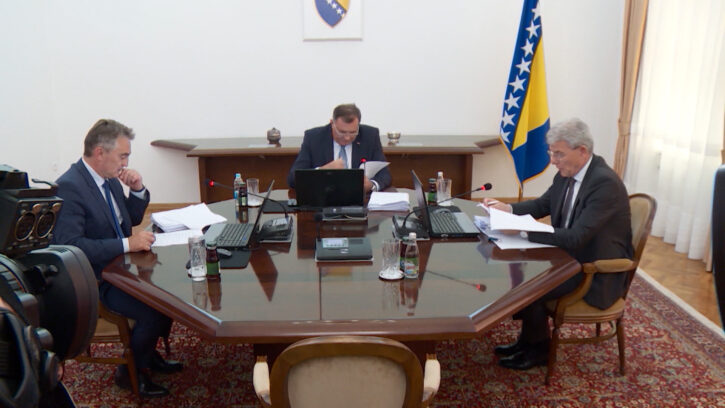
As the EU remained optimistic that Bosnia’s three Presidency members will on Tuesday agree on sending the country’s disputed Annual National Programme to NATO and finally form a government, local analysts and officials continue to be sceptical.
The EU Delegation in Bosnia welcomed a previous agreement political leaders signed in an effort to finally form a government after the October 2018 election and told N1 on Monday that establishing authorities is key in the country’s progress toward EU membership.
“The formation of the authorities in Bosnia and Herzegovina is crucial for the country's advancement in the European Union integration process. In its Opinion on Bosnia and Herzegovina's EU membership application adopted in May 2019, the European Commission recommends to the EU Council to discuss the Opinion and its recommendations after the formation of governments,” the EU Delegation said.
The government has not been formed for nearly 10 months because of disagreements over the country’s potential NATO membership. Bosnia has to send its Annual National Programme to Brussels in order to take the next step toward the alliance.
Bosniak and Croat representatives support the membership, while the Serb political leadership – which initially supported the idea – is now against it.
The Bosniak and Croat members of the Presidency said that unless the candidate for prime minister, who is supposed to come from the ranks of the Bosnian Serb Alliance for Independent Social Democrats (SNSD), is prepared to fulfill obligations Bosnia took over years ago regarding NATO, they will not support his appointment.
In order to break the deadlock, the three leaders of the ruling parties which won the election, SNSD’s Milorad Dodik, Bosniak Bakir Izetbegovic from the Party for Democratic Action (SDA) and Croat Dragan Covic from the Croat Democratic Union (HDZ BiH), signed an agreement last week.
It consists of 12 principles according to which the new government is to be formed, and NATO is mentioned in one of them but very vaguely.
Officials have since then been asking whether Bosnia is going to send its Annual National Programme (ANP) and take the next step toward NATO membership or not.
The EU welcomed the agreement “as an important step forward and a compromise reached by the signatories,” the EU Delegation to Bosnia said.
It said the agreement “should provide a basis to enable a swift formation of authorities and stable functioning of all institutions, which would enable the implementation of much needed reforms,” and called upon the Presidency Members to “overcome their differences through dialogue and compromise in the interest of all Bosnian citizens.”
But local analysts and observers are not as hopeful.
“Regardless of our wishes and optimism, this will obviously not happen,” former defence minister Zekerijah Osmic told N1.
“We are talking about the ANP, and before that we have waited for 10 years to activate the Membership Action Plan (MAP), so now we will complicate things with the ANP and we will wait for some time for that to eventually happen,” he said.
What will likely happen is that “there will be a meeting, there will be some deals, and everyone will give statements to media while we will only extend our time of deterioration,” he argued.
Osmic reminded of how Dodik is still talking about a decision on military neutrality adopted by Bosnia's Serb-dominated region, how Croat Presidency member Zeljko Komsic is directly saying that he will not vote for the prime minister if the ANP is not sent and how Bosniak Presidency member Sefik Dzaferovic advocates for a modified ANP which would suit all.
He also criticised the international community.
“Representatives of the countries which today met with Zeljko Komsic were more decisive before, they were helping us, while now they often say ‘we don’t want to get involved, we are waiting for you to agree on issues’,” he said, referring to a meeting between the Croat Presidency member and the ambassadors of the US and the UK.
Osmic also said that Komsic and Dodik speak to representatives of different countries about the issue.
“We came to a point where the international community has as well become tangled up in this chaos,” he said.
Political analyst and university professor Slavo Kukic told N1 he also does not expect much from the Presidency sessions.
“We have seen countless such ‘D-days’ over the past 30 days, and none of them were a big deal and neither will the one tomorrow be. Nothing special will happen,” he told N1.
Kukic argued that such political discussions are only “serving to extend the agony of Bosnia’s society” and that they represent “one of those days because of which people pack their bags and buy one-way tickets” out of the country.
The session will take place, and again everyone will have their own interpretation on what was discussed, with nothing happening in the end, he predicted.
According to Kukic, all this is just “throwing dust into the eyes of the uneducated masses” and that two scenarios are likely on Tuesday.
One of the possibilities is that Dodik uses the mechanism of vital national interest in the Parliament of Republika Srpska (RS), Bosnia’s Serb-dominated entity, to block the sending of the ANP, Kukic said.
“The other is that he plays dumb and allows it to be sent,” he said.
The SDA had suggested adopting a modified ANP which would suit all the parties.
Kukic said that does not make sense and that the ANP represents the intensity and pace of a given country’s efforts to facilitate NATO’s rules.
“It is up to Bosnia and Herzegovina to set that pace itself. If it is a reduced ANP – that will mean that it is still accepted, but not with the same intensity with which it was proposed,” he said, adding that any narrative saying that it does not imply joining NATO is false.
The agreement the leaders signed does not contain any articles which prevent the possibility of differing interpretations of it, he said.
“(Lars-Gunnar) Wigemark knew that as well,” he said, referring to the former EU Special Representative who was present when the agreement was signed.

